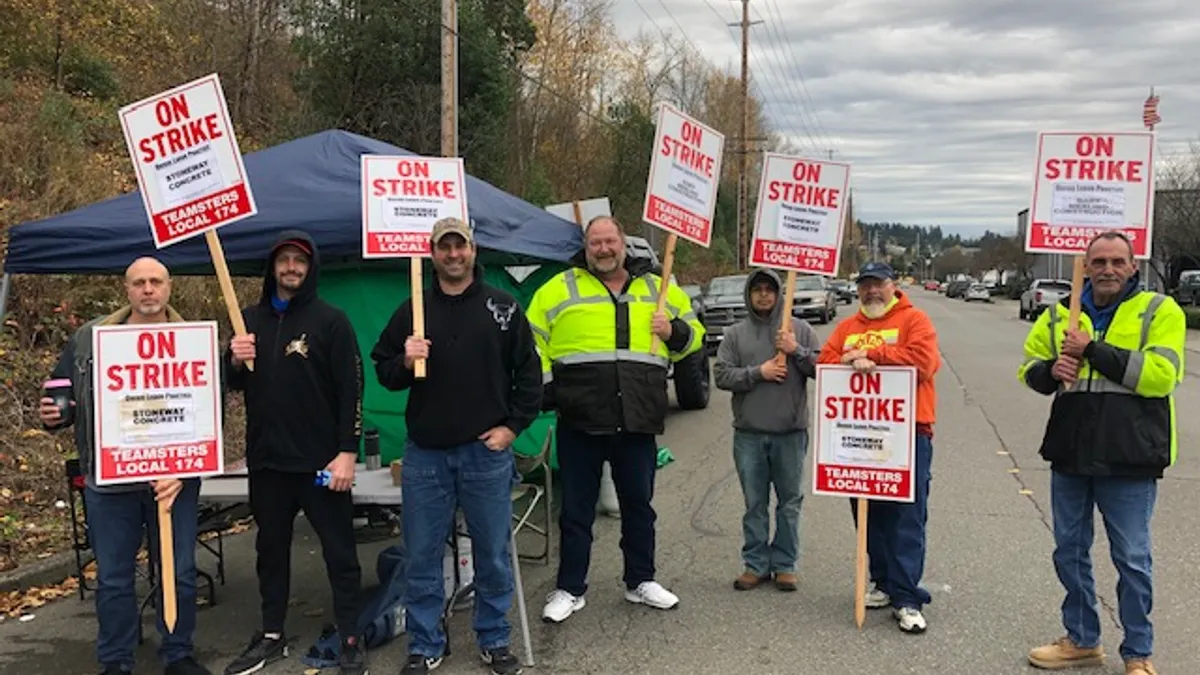UPDATE: Jan. 24, 2022: A mediation session last week between Teamsters Local 174 and employer representatives failed to produce results, meaning a strike involving more than 300 concrete company workers that has slowed projects across the Seattle area will continue.
The Jan. 21 meeting ended "without a resolution to the open labor agreement," a spokesperson for four of the concrete companies confirmed to the Seattle Times.
The two sides met on Thursday, along with Northwest District of Federal Mediation and Conciliation Service Commissioner Roger Moore and Regional Director Beth Schindler. Moore and Schindler decided to end the talks, the Times reported, though they said that the potential for further mediation stands.
Representatives for the Teamsters said in an announcement that they were disappointed by the mediation, alleging that the employers did not advance a worthwhile proposal. The union said there are no further talks planned, and picketing will continue until a contract is agreed on.
Dive Brief:
- Picking up where they left off at the end of 2021, striking Teamsters in the Seattle region vowed to continue to halt the flow of concrete to area projects, having already waylaid 500 truck deliveries to four major Sound Transit Authority jobsites and extended their picket line to the Port of Everett, Washington, on Monday.
- Teamsters Local 174 said 330 of its workers would continue to strike six concrete companies — Gary Merlino, Stoneway Concrete, Cadman, CalPortland/Glacier, Salmon Bay Sand and Gravel and Lehigh Cement — over a contract that expired July 31, 2021. These workers, who are cement mixer drivers and plant employees, are seeking increased wages and enhanced healthcare benefits for recently retired members.
- Initially started with 34 workers on Nov. 19, the strike has grown because the six employers are all covered by one master employment agreement.
Dive Insight:
Since the start of the work stoppage, there has been little progress on an agreement. Representatives for the concrete company owners, as well as the Associated General Contractors of Washington State, said they have been trying to work with the union to start talks under federal mediation for the last three weeks, to no avail. "As a common process in stalled negotiations, we ask why the Teamsters have repeatedly refused mediation," wrote David D'Hondt, AGC of Washington's executive vice president, in a letter to the union.
"The Teamsters have remained willing to sit down and negotiate in good faith," said Rick Hicks, secretary-treasurer for Local 174, in a statement last week. "We are ready to bargain a fair deal that treats our members with the same respect already shown to the other construction trades when negotiating their contracts earlier this year. All we want is fairness."
In a letter Dec. 30 to Seattle-area public officials who had encouraged employers and the Teamsters to resolve the dispute, representatives from four of the concrete companies highlighted the offer employers have made to the union.
"We are acutely aware of impact the Teamsters strike is having on our region and agree that skilled labor is essential to the delivery of concrete in a safe, prompt, and efficient manner," read the letter. "That is why we have presented union leadership with the best package we have ever offered the Teamsters. The package includes a 17.6% pay increase over three years, improves pension contributions, provides excellent medical benefits, and generous retiree medical insurance rarely found in other labor contracts."
But in the Teamsters' statement about the ongoing strike, Hicks said an owners' representative hadn't spoken to the Teamsters in nearly six weeks. On Monday, the Teamsters claimed the three-hour picket at the Port of Everett shut down the facility, and characterized the owners' offer as "subpar."
"These giant, multinational construction companies are demanding that workers accept a package of wages, healthcare and retirement that would be a decrease in compensation over three years when you take inflation into account," said Hicks. "This package would also be significantly less than the compensation packages other construction workers in Seattle receive."
The Associated General Contractors of Washington State, which isn't representing the concrete companies but has been posting updates about the dispute on its website, lobbied for mediation to go forward.
"Mediation is the tool for the federal government to support labor management relations," D’Hondt wrote in his letter.
Far-reaching implications
The Seattle Times reported that layoffs could be in store for related workers such as masons, ironworkers, laborers and carpenters. Sound Transit CEO Peter Rogoff told the agency's governing board that missed cement deliveries will mean delays to the agency's contract milestones, acccording to the paper. "Alternative concrete suppliers are simply not available within our project area," Rogoff said.
The latest work stoppage follows a larger strike by about 2,000 carpenters in the region last fall, which was ultimately resolved when workers agreed to a wage hike and parking benefits. It also comes on the heels of a broader labor movement nationally dubbed "Striketober," as workers from various industries walked off the job that month.
In its statement, the Teamsters union emphasized the cascading impacts the strike is having on other trades.
"Without concrete, construction projects throughout the Puget Sound region will quickly run out of work for other construction trades to perform, forcing the layoff of potentially thousands of workers," the statement read. "The ripple effect of the employers’ refusal to return to the bargaining table with the Teamsters could devastate the local economy — and this comes on top of the impact their arrogance has already had on working families in the Seattle area, many of whom have not seen a paycheck in weeks."
Teamsters Local 174 represents 8,600 workers in the Seattle area, according to its release.














